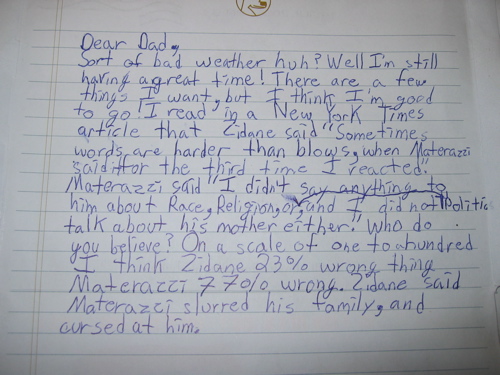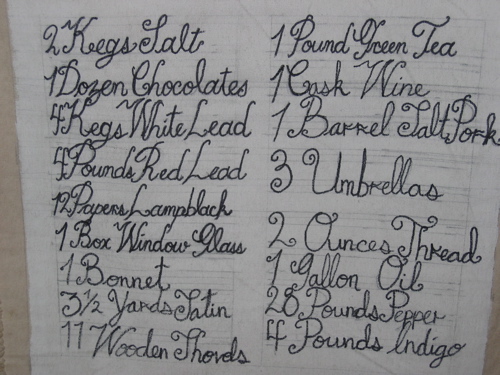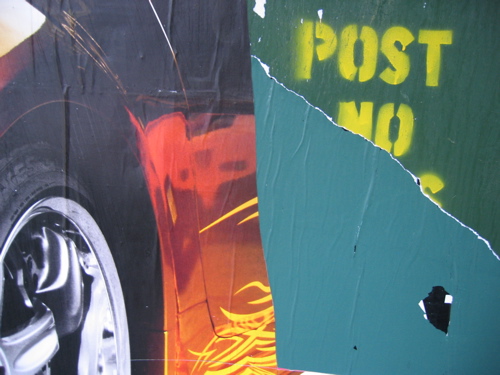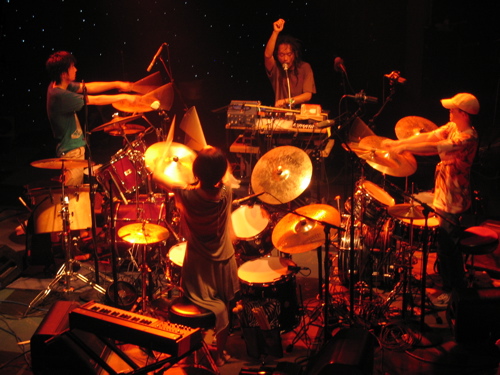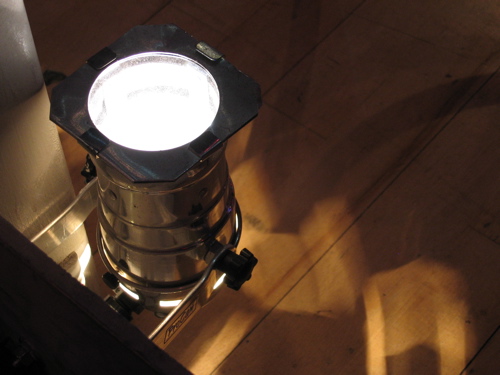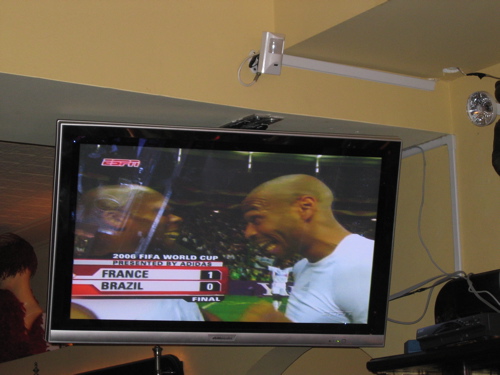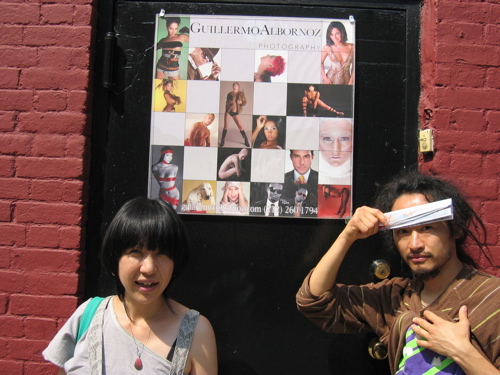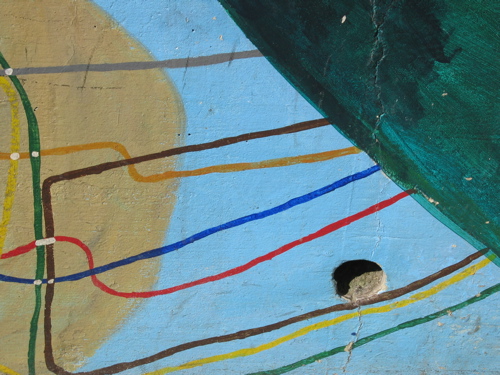July 31, 2006
QUESTIONS FOR THE MOVIEGOER
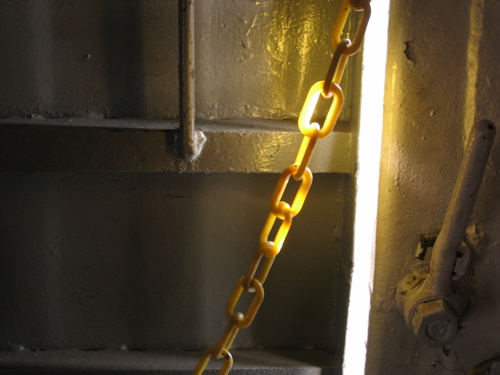
1. Does the reign of Bush II have something to do with the rise in Oedipal adventure movies? "Superman Returns," where Brando finally gets to say "Go, get 'em, Tiger"; "Pirates II"—Turner père and fils, one more barnacled than the other but both piratical in their conflicted ways; and the forthcoming "Lucky You," where Robert Duvall and the terrifyingly overmatched Eric Bana play two generations of card sharks who eventually face each other in the final. (Imagine Bush I rising from his bed to denounce Condi in Beirut, whispering "Shimon....Shimon....")
2. Is Orlando Bloom just Keanu Reeves for the Merchant Ivory set? Basic but not overhwhelming cuteness—no punctum—an inability to establish any chemistry with the female lead, and that one saving quality: the ability to look about him and realize, ten seconds after the audience has, that "There...is...something...afoot," which announcement is usually followed by another commonplace of the anti-hero: "We've got to get out of here." An actual hero's line is, of course, silence. He can't talk—he is holding an entire freight train up with his teeth.
3. How do you cast a young starlet as yourself? Well, you just do it, and then cover your tracks, almost as ineptly as villain Hugh Jackman. First, you sexualize the starlet by putting her in a red bathing suit (best I could do), and have someone comment on this—"I couldn't get the image of you in that red bathing suit out of my mind." Her woman-ness established, you ignore it, and then further desexualize the character in an array of bad clothing and towels. This gives Scarlett license, as a kind of semi-gendered figure, to deliver the Woody 2.0 lines about "admiring your enamel" and suffering nasal congestion when sad, minus the stuttering.
Johansson and Allen don't present in "Scoop" as lovers, or comic partners, or even foils. Allen hints at what is actually afoot when he drops the one-liner about converting from "the Hebraic faith to narcissism." "Scoop" is a mirror game, a reflexive, flexible dream of Woody The Stand Up Comic hitting the road again, getting the girls, or maybe being the girl, or maybe being their father or...well, these are all fine lines in Allentown. "Scoop" also looks like it took three days to shoot, and this flimsiness is enjoyable. I mean—the dude from "Deadwood" plays a ghost.
July 28, 2006
HMM

Sad to see this report. In person, Fiona never seems unhinged to me—no more so than any of the other neurotic New York artists I've spent the last thirty-nine years with. And, to compare: Fiona killed at Nokia last year, and did not rant. Her limited banter was fairly charming. I can only wonder and worry.
July 27, 2006
TALKING SKULL

Opining on things I am barely qualified to talk about, having never owned a Misfits skull shirt.
July 26, 2006
July 25, 2006
GADGETISM

Thanks to all who wrote. So: To back up the contents of the Address Book on your Motorola Razr V3 to your Mac, connect the device with a USB data cable (or use Bluetooth if you like that little blinking blue light). Start the iSync application on your Mac, and answer the straightforward prompts. I put my Razr events into the Mac's iCal; the Razr's Address Book dumped into the Mac's Address Book automatically. (It took a moment of finding to find the Address Book.)
July 24, 2006
RECORD STORES, PART 0
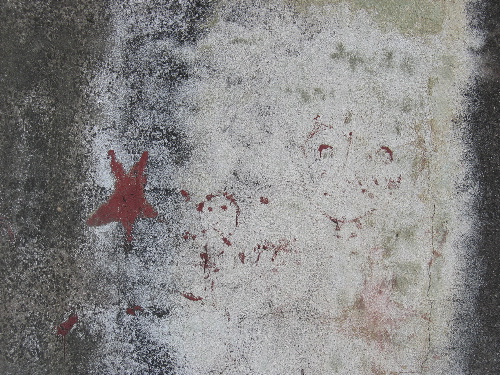
"Good fucking riddance"? Seems a bit reductive, no? What was that? A conclusion, a flare sent up in the sky, a collated guess? An angry burp?
In the service of answering these questions (perhaps a banal idea to begin with), I wrote down something about every record store I've ever frequented with any regularity, a task that became less engaging the longer it went on. (One-off visits while out of town on tour or vacation were not included.) I will post it below, soon. I think the easily-predicted punchline will go a little something like this: "Pleasant record store people are pleasant. We miss those people."
July 22, 2006
July 21, 2006
CAVEAT
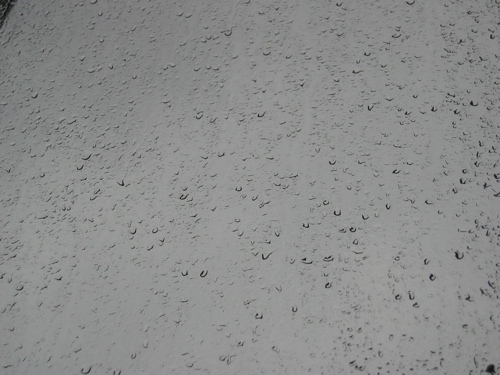
If we must have DJs channeling Radiohead, better Mark Ronson's cover of "Just" than the stealth turbo turd DJ Shadow is about to let loose.
SUMMER'S CAULDRON
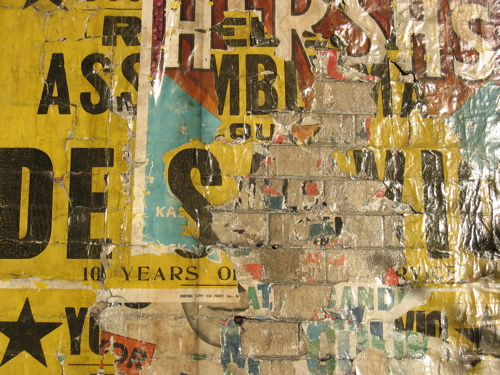
What up. Can you feel Times New Viking? I hope so.
Then. Again. You could go to the source: "Summer's Cauldron," which I just rocked for the fourth time.
Has anybody heard Saving Jane? I am particularly fond of "Imperfection."
RECORD STORES, PART 10
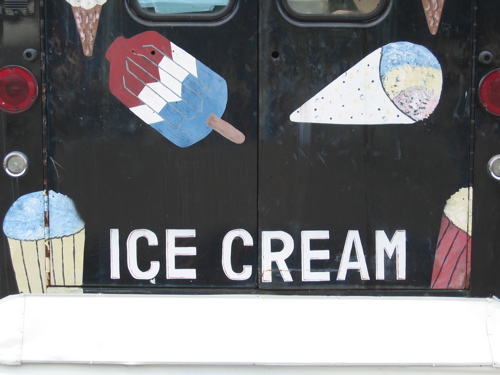
This is the last installment—and a good one—before I drop part 0: a long and boring account of my experiences in, and with, record stores.
Dave T-T-T-Tompkins: "I worked at the Record Exchange in Raleigh, NC.* I was hired for rap and made tapes for kids who were into Cannibal Corpse. They wore pink Baskin Robbins shirts streaked with chocolate. Entrails and ice cream. I forced Freestyle Fellowship on anyone who’d stick around long enough for a dub. I didn’t have time to be a dick really because I was too busy getting educated on all kinds of nonrap shit by people half my age, records I missed out on while listening to way too much New Jack Swing. Anyway, these kids—“these kids!”—were the only ones buying vinyl, of which we had little. Schoolly D always boosted store morale.
There was a two way interrogation mirror, behind which we did the mid-day cash count. One time I dozed off, drooling, with a wad of twenties in my hand. From that day on, I was introduced to customers as Hip Hop Dave Who Passed Out With A Stack of Twenties In His Hand HaHaHa.
I now mainly buy and trade vinyl. Digitally, I mainly count on the kindness of burns and downloads. My roommate works at The Sound Library, a Manhattan store which once had an asshole reputation, despite him being the nicest record store I guy I’ve met. Incredibly patient with every insane query. And I’m not just saying that because he leaves me alone with his records while at work. The store is closing soon anyway.
*the guy from Zimbabwe Legit worked at the store in Blacksburg, Va."
Eric Harvey : "In Indianapolis in the mid-to-late (pre-p2p, pre-eBay) Nineties, there was a boom—and I mean a boom—in second-hand CD stores. Anyone with a willing to pay strip-mall rent could make a minor living by selling gently used copies of 'Songs of Faith and Devotion' and 'Shakedown Street' and sometimes drug paraphenalia, and those looking for twenty bucks for the weekend could finally part with Terence Trent D’Arby’s second album and whatever else was gathering dust on the shelf. This boom only lasted for a year or so; between the point when CDs turned 10 and their initial novelty had long disappeared, and the time very soon after when people figured out how to extract the digital files from the discs and distribute them for free. The selection at these stores was predictably scattershot, but you could occasionally find a gem among the detritus. Among seemingly endless copies of 'Candlebox' and 'Emotional Rescue,' I managed to obtain, during the glorious summer of 1998, all but two of XTC’s major releases, 'Freak Out!' and 'Red Clay,' both of which I was amazed to find: I couldn’t grasp why anyone who came into contact with either would sell them back, but I was glad they did. The best thing of all about the used CD stores, though, was the fact that the clerks knew better than to try and pull rank on me.
There was what I called the 'walk of shame' with the snotty clerks at Luna Music or Missing Link, when he/she (there were plenty of shes), came from behind the counter with a pronounced sigh and, with all due exhaustion, walked me toward the section of the store I would have known if I knew anything in the first place. The fact that these people had not only the precious information I needed but the physical artifact to boot seemed to elevate them several thousand leagues above me in whatever hierarchy existed there, and they knew it. Or maybe I knew it. Regardless, and this was even worse, when I was checking out, a clerk would often motion to another idle clerk by holding up a CD I was buying. Whether it indicated silent affirmation or derision I never knew, because the other clerk would always seem to raise an aloof eyebrow before returning to his or her copy of 'Maximum Rock and Roll.' Whatever interpersonal dialogue was going on between these clerks was isolating and weird, and I didn’t like it one bit. But nothing of the sort happened at the used CD stores, because the odds were they didn’t have it. The clerks were fully aware that their stores relied on financial desperation or cultural ignorance or weekend feng-shui binges to stay in operation, and thus they usually stayed seated behind the counter with a to-go cup from the sub shop next door and whatever CDs they brought from home playing over the PA system."
RECORD STORES, PART 9
Julianne Shepherd: "I worked at a corpo record store, in 1997, in Springfield, Missouri, a part-time gig to supplement my tips as a shot girl at the local club. The store was attached to a Starbucks in a strip mall and we could only play store-bestsellers on the stereo system, which meant that all I listened to for an entire summer was Puff Daddy & the Family's 'No Way Out' and Deana Carter's 'Did I Shave My Legs For This?'. The corporate environment was like an equalizer: we sold independent records (i.e. Magic Mike bass xplosion; Helium) but side-stepped record-shop snobbery, because most people wanted to buy either the Ozark Mountain Daredevils and/or Biggie, usually on cassette. Also, if I appeared salty or churlish, customers would offer to pray for me, so I feigned cheer as a defense against evangelical Xtianity.
One 'archetypal indie record store' maxim held fast, though: if you're a girl who works in a record shop, while people might trust that you know what you're talking about, generally, your male cohort is assumed to know more. So in that sense the 'archetypal indie record shop' can be like a real-time version of the blogiverse.
Sometimes I go to Beat Street on Fulton or that one tiny record store on Flatbush and Seventh in Brooklyn (does it have a name?), but usually I just get stuff from the interweb because it is cheaper. And I work for an online record store (urge.com), so, duh."
J.D. Considine: "I worked my way through college in a record store. We were an indie store based in a shopping mall—this was back in the days of LPs and 8-tracks, long before Sam Goode defined the suburban shopping mall music store as a badly-stocked shithole—and the owners discouraged anything resembling clerk snobbery. They liked the idea of selling records, and encouraged the staff to share its knowledge with customers. I was there for almost five years, and finally quit after getting yelled at for playing Ian Dury's 'Plaistow Patricia,' which, admittedly, wasn't an ideal selection for a suburban shopping mall.
I've never had any particular problem with snobby record store clerks, but I do get bugged by snobby stores; that is, places that file stuff based on some system that presumably makes perfect sense to the owners/staff, but mystifies me as a customer. Soundscapes here in Toronto is particularly annoying that way, subdividing its wares into style-based ghettos. I'm never sure whether the idea is inclusion or exclusion.
Back in the late '80s, I used to be driven crazy by the Tower Records in D.C. near GWU; it had a good international section but limited understanding of geography, which made browsing more of a struggle than it should have been. I also remember going into a Kemp Mills store in Baltimore once and finding Wayne Kramer filed in the rap section. When I suggested to the clerk that he might sell better in rock, she replied, 'Yeah, but that's the way it is in the computer, so we wouldn't be able to find it if we moved it.'"
July 20, 2006
RECORD STORES, PART 8

Matthew Perpetua: "I feel a bit strange when people talk about hostile record store clerks, because in all of my experience (and it's pretty extensive from 1994 up through 2002 or so), it's always been a neutral interaction for me. I've always thought the clerks at the Kim's stores were creeps, but that's really not the same thing as them being hostile toward me. My favorite New York record shop has always been Other Music, and contrary to the experiences may other people report, most of their employees over the years have been really friendly to me. But 95% of the time, it's really just a person sitting there taking your money and you leave. Maybe it's always been easy on me because the only questions I ever ask are along the lines of "is this still in stock? do you maybe have one in the back?" and I rarely engage record store clerks in any sort of conversation that they don't begin themselves.
At this point in my life, I am dealing with a daily (over)flow of CD promos coming my way, and the last thing I want is to actually buy more of them when they clutter up my apartment, and I only listen to music on my computer or on my ipod. I don't even have a stereo. Most of my time spent in record shops is occupied by either browsing for things that I have not heard and want to check to see if they are good enough for my site(s), or selling promo CDs. But I do fondly recall burning regrettable sums of money in record shops when I was a teenager, and things were still new and magical.
I remember the first time I ever went to a real indie record shop. I was taking a weekend art class at Pratt when I was a senior in high school, and I must have asked my classmates if they knew any good shops. This lovely girl named Lucianna brought me to Kim's on Bleecker, and it just blew my mind. I'm fairly certain that I bought The Fall's 'A-Sides' album that day.
Anyway, in terms of bad clerks, record store people tend to be worse than comic shop and book store folks, but definitely not as bad as music gear or video store clerks."
RECORD STORES, PART 7
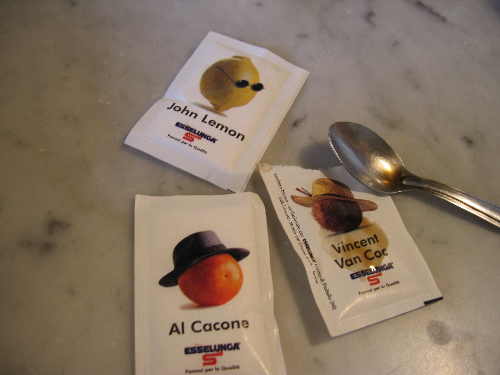
Michael Robbins: "I'm not especially going to miss any particular record store, but the last time I was in Hyde Park Records on 53rd in Chicago, buying Wire's remastered 'Chairs Missing,' the clerk ringing me up had the following exchange with the clerk looking for the CD behind the counter:
Clerk 1: OK. You're parachuting into the shit.
Clerk 2: Late sixties or early seventies?
Clerk 1: Doesn't matter.
Clerk 2: OK.
Clerk 1: Who would you rather have backing you up: four Bobby Fishers, or the guys from Wire?
Clerk 2 (without pausing): The Bobby Fishers, because he's crazy.
You can't download that sort of thing. It's born of boredom and the frustrating sense that your store of knowledge is both vast and completely useless."
RECORD STORES, PART 6

Joe Gross: "Kemp Mill Records was a local record store chain based in Washington, D.C. At the peak of its success, the company had stores as far north as Delaware and as far south as, I dunno, the Carolinas, maybe? Atlanta? Over thirty stores, anyway.
The company’s business plan was both smart and its undoing: music was the loss-leader. The stores made money on accessories and the like. (It was an unusual thing for a CD to cost more than $12.99. Most were $9.99 to $11.99 in the very early 1990s.) Selection-wise, the stores were somewhere between the suburban consumer fantasy of a Tower Records (you had to drive out to Tysons Corner for one of those) and the truly depressing selection-vs.-price ratio of a mall music store (what’s up, Sam Goody?).
It was exactly the sort of local chain that was destroyed by the rise of big box stores like Best Buy, which could do the same thing Kemp Mill did on a mass scale. Kemp Mill are down to maybe one or two stores now, if that.
There was a Kemp Mill in a strip mall down the street from my middle and high schools. (Yep—same building.) I wandered in there pretty much every day after school. As a music dork, compulsive talker and extrovert, I was a big fan of knowing the people who were selling me things. I’m still that way—a very “great good place” kinda guy. I was in there so much that they offered me a job as Christmas help. Since I was just about to ask them for same, I jumped at it.
I ended up working there a few days a week after school and one Saturday or Sunday a week from fall of 1989 to the spring of 1992. As a teen incapable of a decent romance (I spent so much time in the Friend Zone, I built a summer home there) beset by anxiety (Paxil, stand the fuck up) and uninterested in Jesus, though many of my peers were Young Life types, I can honestly say that that job saved me from pulling some wussy, minor-league Columbine shit.
I loved that gig and it loved me back. I was the youngest employee there by at least six years. I took my first shot of Jaeger; borrowed my first issue of Forced Exposure, Bukowski, Celine and other staples of sensitive young man lit from a co-worker; fell in love with Austin, thanks to that same co-worker’s stories; became addicted to Stax/Atlantic soul; and heard countless bands for the first time. (For a record store in the Chocolate City’s most egregiously vanilla suburb, it had an amazing go-go selection. I wish I still had all my $7.99 P.A. tapes.)
There was a distinct lack of hipper-than-thou-ism, possibly because it wasn’t a particularly hip store. I enjoyed everyone I worked with and, not to wax my own car, but I was amazingly good at this job. My customer service skills fucking ruled. I was friendly, I was good at reading people (leave-me-alone vs. help-I’m-lost) and I just loved turning people on to stuff. I was Mr. “If you like this, you might like that.” My finest hour? The week after I sold a gal some CDs, she returns: “My boyfriend liked the ones you picked out more than the ones I picked out. What else you got?”
I mean, why the fuck try to alienate someone who is maybe buying a record for their brother or niece or significant other? I didn’t like Phil Collins, but goddamn it, Phil Collins kept me in pocket money. Not once did I ever see an employee be a dick to a customer. Again, no hipness seemed to be at stake—this wasn’t Smash in Georgetown, Vinyl Ink or Yesterday or Today, D.C., area stores where hipsters worked. These were folks who fell into retail, or wanted to pursue it as a career, or were underemployed death metal drummers. (That one gave me my first Sepultura album. I gave him his first Ministry album. We got along great.) That said, it was also a part time job for me. I wasn’t a manager and I wasn’t stuck there wanting to do something else. I had a blast.
Austin is lousy with decent record stores at the moment and I like almost all of them for different reasons. Sound on Sound for punk and hardcore; End of an Ear for avant-dork stuff; Musicmania for H-town hip-hop, etc. I also buy plenty online—eBay, Half.com, downloads—but it’s not nearly as much fun. The demise of the brick and mortar store is a damn shame. It kept me from going nuts and I suspect many others can say the same."
RECORD STORES, PART 5

Amir, or Amir: "Because I am a DJ living in Tel Aviv, a city without real vinyl record stores (except for two fairly good second hand shops that cater to the whole DJ/collector community), I visit record stores like crazy when I go abroad, and usually manage to develop good relationships with the clerks.
Visits to real life record stores allow for an elusive random factor of walking in and, purely by chance, overhearing something you can't name, responding to it, and having the clerk—who can't name it himself—respond to it: "You like this? Well, there's also this thing here, and I don't know what to call it, but you might like it as well." I've gotten some of the most precious records in my collection through this kind of interaction. As unmediated human interactions by essentially non-verbal systems disappear, this experience might get lost as well; hence the popularity of—but limited satisfaction offered by—the 'customers who bought this also bought' type of collaborative filtering software."
Michaela a/k/a/ Cindy Hotpint chimes in on her own site.
Michael Pop: "I feel like I am the last of a dying breed. I am twenty-five years old and have been buying CDs since I was sixteen. I can't download a song to save my life, and I have only a vague idea of what iTunes is. I memorize release dates and look forward to them with anticipation. I do not preview music online before buying it. I take educated leaps of faith, the old-fashioned way: through word-of-mouth.
When I was seventeen, I went to a hole in the wall in Santa Monica called Moby Disc. I'd driven past it many times, but could never muster the courage to go inside. Even then, I was aware of the snobby clerk stereotype, and I didn't want to get yelled at if my choices didn't pass muster. When I finally took the plunge, I was relieved to find out that things were not as I had imagined them. If anything, it was all business; I did my shopping, they rang up my purchases, and I was on my way.
After I had been shopping there for a few months, one of guys who always rang me up commented on one of my selections. He said that if I liked that record, then I'd probably like this and this. From behind the counter, he produced Teenage Fanclub's 'Bandwagonesqe' and The Posies 'Frosting on the Beater.' He gave them to me for free and said if I didn't like them to just bring them back. Those two records had a profound impact on me, and I credit them with shaping my musical landscape.
That man was Rusty Squeezebox of Baby Lemonade. Over time, we developed a friendship. I trusted his recommendations, and he rarely, if ever, let me down. I gave Moby Disc all of my business until they went out of it. Since then, it has been one heartbreak after another: Liquid Music in Pasadena, Rhino Records in Westwood, Aron's in Hollywood. I love shopping for, and discovering, music, but it gets harder every day. It's sad that people like Rusty—helpful, knowledgeable ambassadors of good music—have become marginalized by the Internet."
July 19, 2006
RECORD STORES, PART 4

Jane Dark: "I'll admit that I have no commitment to my local's profitability, and I download music for free as an economic decision. That said: I love my local (Amoeba). It's big, and has lots of clerks; with most of them, I have only a pleasant nodding relationship. When I have more in-depth encounters with the three or four I've gotten close with—although we have great aesthetic differences—they are thoughtful and enthusiastic and funny and good company. For a solitary part of my life, record store clerks were almost the only people I spoke with in person, for maybe eight months (and the guy at the gym), and it was just fine. Also, I sometimes see them in the streets, at the movies, etc., and we always have a chat exactly as if we were friends.
On the other hand: Rasputin's? Which is down the street? They're assholes. Don't get me started.
When I was 18, I worked at the famously corrupt Strawberry's chain in Boston. Talking to customers was the only part of the job I especially liked, though some of that talking was certainly good-natured hectoring about disagreements in taste."
John: "I lament the passing of record stores. First of all, I think record store people get a bad rap. Many of them—as portrayed in 'High Fidelity'—are greasy, anti-social, and insecure to begin with, so I don't take it personally when they are dicks. I think Rocks In Your Head had to be the worst place for dickish non-helpful record store people.
If you approach them with reverence, they will treat you like crap. If you approach them as a fellow music nerd, they will talk to you for hours.
I still buy most of my music in CD form. Downloading from filesharing programs takes too long and killed one of my computers. I rarely get stuff from iTunes: just single songs. I like having the CD, and I'm afraid of my computer crashing again.
I felt sad this past weekend when, after some afternoon drinks, not one of the four people I was with wanted to go to Amoeba with me. (We were parked just 2 blocks away.) They said, 'I only get stuff at Amoeba that I can't get on iTunes.' So sad."
Andrew Sherman: "How much does it depend on how insecure you feel? Aquarius in San Francisco seems like a hipster place, but when I asked for help choosing a Magma CD, staff members were called from the office to help make that crucial decision. For a long time, whenever I went into an art supply store, I was put off by the snooty artist clerks. But after taking some classes, I realized they're no better than me, that they're bored, underpaid, and that they will help if asked. Nicely."
(Ed.: We, too, have had pleasant experiences with the staff of Aquarius. Many, in fact. Mail order, holler!)
RECORD STORES, PART 3

Fred: "I worked at a record store (Rasputin's in Berkeley) for one long summer. The pay was minimal, we could only use our employee discount for one hour on Thursday, and every time we left the store we had to be frisked by a manager. Crap conditions, but I never started hating the customers (beyond the standard 'If one more person asks me where the bathroom is, I swear,' clerkish exasperation) and I don't think anyone else did either.
What I suspect happens is: customer walks into independent record store feeling slightly self-conscious about wanting 'McCartney II.' Customer brings album to register and encounters Standard Clerkish Exasperation. Customer interprets SCE as sneering condescension. Customer leaves store with exaggerated picture of sniveling hipster record store clerks and is even more self-conscious the next time he wants a Macca solo product. Repeat until customer hits up Virgin or eBay.
It's a bother to feel self-conscious about buying a CD (whether that's the clerk's fault or not), but it also feels nice when you get into a discussion about 'McCartney II' with someone at a shop. There is something of an approval/disapproval game going on there, but it's the same game that everyone plays when they put their CD collections out, books on their shelves, posters on their walls, etc. Those that just want to own 'Venus and Mars' and be done with it will use Amazon. Those that see records as small but significant facets of their personality to be acknowledged by the outside world will keep going to stores. Not sure whether the latter is healthy but I know I'm it.
Side note: I've been to many of the record stores mentioned in the Times piece and it doesn't surprise me that they're suffering. But I don't think its only because the'yre record stores and record stores are old and outdated—I think it's because these particular record stores feel old and outdated. The last time I went into Sound Track in Park Slope, there was a solitary middle-aged guy at the counter, peeling linoleum on the floor, and anonymous acid jazz playing. I felt out of place at 23, and at 13 I doubt I would have even gone in."
Rob Lomblad, Reckless Records, Chicago, 1997-2004: "Some people want everything from you, while others want nothing. It only takes a few encounters where you give a customer an enthusiastic amount of info and receive a shrug in return to decide that from now on you'll keep your mouth shut.
In regards to clerks being frustrated artists, I'd have to say that it may be an unavoidable stereotype. The flexible schedule of most clerk-type jobs is welcoming to people who've got artwork to make, practice to go to and tours. If people were successful enough to not work, why would they? Many of the people that I worked with were marginally successful, i.e., made enough for the music to pay for itself, but had to work to pay bills.
It may come down to a basic contradiction: Often, the people who would have the most to offer as a clerk in one way (an abnormal amount of musical information in their brain) are lacking in the the other, more social thing (an acceptable amount of customer service skill)."
RECORD STORES, PART 2

What Mike Barthel says below about musical instrument stores is not news, but it is relevant. (One major exception in New York: 30th Street Guitars, where Matt and his brother are nice to everybody, even people who act like titanic babies.) It would be nice to hear from a) women; b) people who love record stores and lament their passing (and there is a confused part of me that is one of those people); c) people so young they've never been into a record store; and d) people who, for any reason, have only ever bought music in stores and don't get music online.
Andy Kellman: "Recently, while in the adjoined room of a Portland shop, I walked toward a nearby counter with a stack of CDs. It's possible I didn't notice a sign stating 'PAY IN THE OTHER ROOM,' but I saw a counter, a person standing behind it, and a monitor: I assumed I could pay there. The clerk behind the counter looked at me like a solicitor who had come to his doorstep on a Saturday morning: 'Would you like to listen to all of those?' I said, 'No, I'd like to buy them.' He gestured toward the other room and huffed, 'You pay over THERE.' I politely said thanks. He said nothing.
Maybe he, like a surly former manager I once worked under, is supporting two autistic kids and a wife on $20,000 and restricted health insurance, working 55-65 hours weekly, commuting an hour every day, and handling a mostly lazy staff. I gave him the benefit of the doubt, even though it's more likely that a co-worker had just pulled rank and snagged a promo he wanted.
Music retail was easily the most stressful job I've ever had, especially when I was a manager, and my shyness has been misinterpreted since forever, so I'm certain that a few customers throughout the years thought I was a jerk. But if I ever acted like that toward ANY customer—particularly one who intended to purchase the equivalent of my day's pay pre-tax—I deserved to clean public restrooms for at least a week.
It had been a while since I last shopped at a record store. I was missing it a whole lot, yet it didn't take long to remember how bizarrely demeaning and fucking tedious it can be. That said, I'd like to one day give my son the same thrill my Dad gave me when he'd take me to record stores and let me pick out something. Surprising my son with a new folder on his hard drive does not have the same appeal."
Davin: "There is something fundamentally disorienting about being asked to pull a thin veneer of friendliness over an avalanche of corporate indifference and greed. 'We don't care about the customers, but you need to try to convince them we do. And they won't believe you, and they will hate you for that. Also, clean the toilet.' That being said, it's almost refreshing to be directly shat upon by someone rather than the indirect contempt one gets used to. It seems more honest. But, of course, it's not—the Asshole Record Clerk is as much a performance these days as anything else, thankyouverymuchNickHornby. What's that tourist restaurant in Chicago where the schtick is the wait staff are mean to you?"
Mike Barthel: "All of my record store interactions have been good ones; the people in Kim's have even been friendly and supportive. I've had lots of bad video-store interactions, though, which I think fits in with the 'frustrated artists' thing. Recent history indicates that many directors work at video stores at some point, so your renting something that does not fit within their aesthetic values system indicates that their films, once they actually come out, will not receive your support, since presumably said films will fit within their aesthetics value system. I don't think it's that explicit, but it's probably at the root. A clerk at Kim's Underground was once so rude to me I burst out laughing.
What I'm interested in is why people who work at musical instrument stores are such unabashed dicks. Every band I've been in since high school has been with girls, and inevitably they will ask me to come to Sam Ash or Guitar Center with them so they can get what they need without being condescended to or ignored. It's pretty bad. (The major exception being that one guy at First Flight, who's always real nice.) I remember what it was like when I started walking into instrument stores and getting paid attention to, and it was very weird. It was like they could sense that I now 'bought gear' rather than being a broke-ass kid who just wanted to play some guitars for a while. But the sexism is so blatant. I assume it's because guys who work in guitar stores tend toward the metal/'RAWK!' end of the spectrum and the attitude toward women just sort of carries over, but man, I don't know."
RECORD STORES, PART 1
Record store tales, edited for clarity and/or length:
Blackmail Is My Life: "I worked for more than two years as a clerk at a snooty video store here in Philly. It was miserable not only because of the irregular hours and the working conditions—including the pay—but also because the customers' needs were so unpredictable. Some wanted their taste in film to be validated, while others wished to be punished and ridiculed. It was an exhausting job, not unlike working as a dom in an S&M dungeon.
Customers' expectations were not only that you would serve them like a slave, but also that you'd be cordial enough to avail them of your formal education, and your informal education as a video store clerk (free lessons in auteur theory, etc.). The problem is that they often didn't want an opinion at all; many times they were just looking for a sparring partner, and were either too lonely to find one or felt that their intimate friends weren't up to the task. And these are just the aspects of the job that don't incorporate any aspect of waged work to begin with—viz. I haven't really mentioned my bosses in this formulation.
[Here's where I mention something about "Eroica" and how there are too many bourgeois individuals. How can they all think they're the only one who wants to rent "Pirates of the Carribbean" when the sequel came out last week?]"
Mike Doughty: "Sullen record store clerks are disarmed easily by your being unafraid to ask questions about music you don't know about. It unnerves them that you don't buy the notion that a lack of knowledge is inferiority, and that you're actually trying to learn stuff by ASKING."
XXXChange: "I think many record store clerks may be frustrated musicians or artists. Resentment towards the customer might really stem from the fear that the customer might not recognise the clerk's genius. The clerk says "You haven't heard _____!!!?????" while silently thinking "How could they ever appreciate MY music if they havent heard _____."
Maybe this is wrong, though, because you hear the same exclamation from record collectors who have no artistic ambitions. This happens with collectors of all different genres but mainly, in my experience, collectors of indie rock and rare funk records. Collectors like to flaunt their knowledge of obscure/rare records as a badge of how intelligent/cool they are. This name dropping has more to do with their ego than any desire to point out something the other person might enjoy. Music nerds can be really unpleasant people, I guess. They also make up nearly all my friends."
Amar: Most of the interactions I've had at record stores have been agreeable. Ron Benway—who ran Benway Bop records in Las Vegas for many years before retreating to L.A.—was one of the nicest guys you could hope to meet. I guess owning a store and just working there are two different things, though. If you're making minimum wage, don't get tips and are an opinionated music nerd to begin with, it would be more surprising if you WERE nice to customers than the other way around."
July 18, 2006
MY FAVORITE WRITER, RIGHT NOW
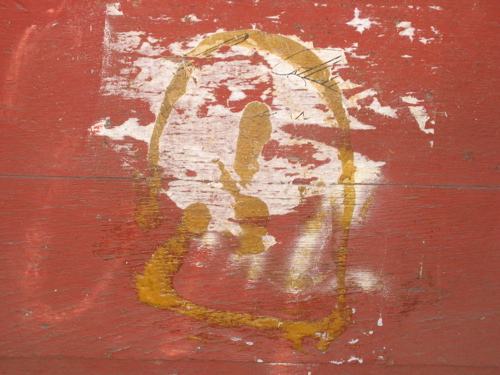
Agreeability isn't usually a trait I value, but Rhodri pulls it off. Maybe it's the ease of his prose, or the hint of disagreeability right behind the friendliness.
July 17, 2006
COME AND KNOCK ON OUR DOOR
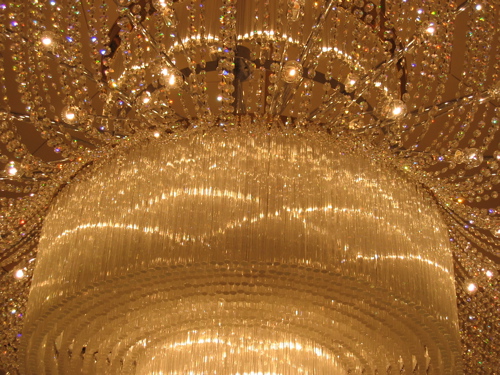
This piece in Sunday's Times about the graying, and disappearing, of record stores, set off several conversations, each of which ended with someone saying, give or take a qualifier, "Good fucking riddance."
I made friends hanging out at record stores. I enjoyed my bazillion hours of solitary digging. But for many, many people, record stores are the worst thing that ever happened to music. The people who work in them, give or take an educating angel, are terrifying. Even if you spend most of your waking hours hanging around and bonding with asshole clerks, your reward for this investment of time is receiving a treatment only slightly less hideous than that given to every other customer, all of them impossibly stupid and retrograde in the eyes of the employees. Working at a record store turns perfectly lovely people into misanthropic turds. I hated asking for music on my birthday because I knew my mother would have to go, without armor, into a shop where someone would be unnecessarily mean to her. I also suspected that this act of minor sadism would be the clerk's primary form of joy during the work day.
I am guessing, unscientifically, that the internets is a much less terrifying place for people to shop—you don't have to apologize for wanting a Ralph Towner record, missing one of the Sub Pop 7-inches, or not understanding why Papoose is such a big deal.
Holler back with tales of agreeance or disagreeance. I would love to read a solid theory of what exactly causes record store clerks to become bouillon cubes of disdain. I have had several service sector jobs: waiter, counter-person, telemarketing phoning person, messenger, pizza-making sub-person, a couple of others (one involving the killing of weeds with a fluorescent yellow liquid). Though these jobs often made me, and the people I worked with, tired and angry, none of them made us want to ritually humiliate our customers for trying to buy what we sold. For instance, waiters have much longer and more potentially dicey interactions with patrons than record store clerks do. People buying records don't, on average, hang out for an hour and ask you to do ten different things. Is it the low pay? The lack of tips as incentive to be pleasant? The working conditions? The turf wars of identity that popular music embodies?
No need to remind me that Nick Hornby wrote a book called "High Fidelity."
ROAD TO NO REGRET
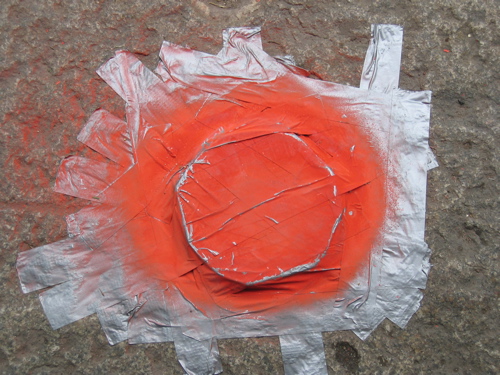
Notes on this week's Scritti Politti column:
1. I did not make it entirely clear—though I should have—that "White Bread, Black Beer" is the first Scritti Politti album since the early Rough Trade singles (which do repurpose reggae, from "Skank Bloc Bologna" on) not to be rooted largely in reggae, R&B, hip-hop or a combination thereof. The title may have something to do with this—maybe not.
2. The false binary of the subhead is not mine.
3. The rockism debate began in several places, and with several people, most of them English. Green is the person who introduced me to the idea of rockism (or anti-rockism) in an interview he gave to one of the British music weeklies in the 1980s.
4. Green is the motherfucking cat's pajamas.
July 14, 2006
ONE OF MANY
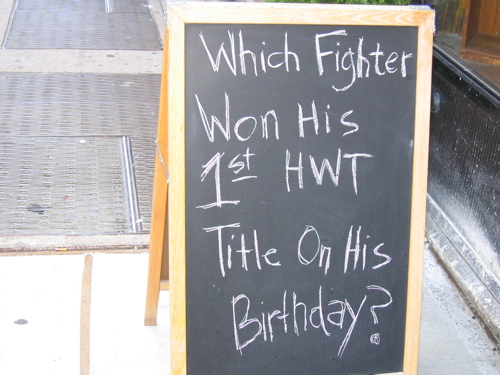
I am comfortable with HTML, but a total ignoramus when it comes to coding, so I'd like to ask someone who knows: How long does something like this take? After watching one of these, it seems unnecessary to read the alpha page just to verify the impression that turning Mario into Frodo must take for-fucking-ever. But there's plenty of web ephemera out there, and it can't all be so time-intensive on the production end. I just want to know the number. Is it like songs and beats, where you can do it in a few minutes, top to bottom, if you're in the zone? Or is it more like an hour?
This, I am guessing: not so long.
July 11, 2006
REPUBLICANS
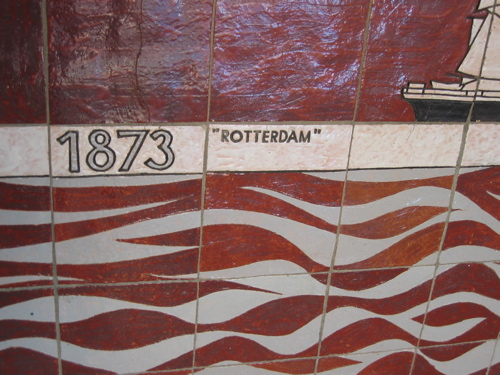
Jon Kyl
Rick Renzi
J.D. Hayworth
John Doolittle
Richard Pombo
Brian Bilbray
Marilyn Musgrave
Doug Lamborn
Rick O'Donnell
Christopher Shays
Vernon Buchanan
Joe Negron
Clay Shaw
Bill
Sali
Peter Roskam
Mark Kirk
Dennis Hastert
Chris Chocola
John Hostettler
Mike Whalen
Jim Ryun
Anne Northup
Geoff Davis
Michael Steele
Gil Gutknecht
Michele Bachmann
Jim Talent
Conrad Burns
Jon Porter
Charlie Bass
Mike Ferguson
Heather Wilson
Peter King
John Sweeney
Tom Reynolds
Randy Kuhl
Robin Hayes
Charles Taylor
Steve Chabot
Jean Schmidt
Deborah Pryce
Joy Padgett
Melissa Hart
Curt Weldon
Mike Fitzpatrick
Don Sherwood
Lincoln Chafee
Bob Corker
George Allen
Frank Wolf
Mike McGavick
Dave Reichert
SHELF LIFE
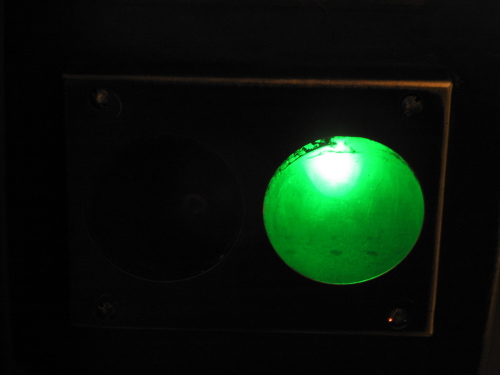
Because the Constitution has more to say about ownership than beauty, The Mars Volta are entirely within their rights as Americans to call an album "Amputechture." No-one can stop them. Not even you.
The Justin Timberland Blues Explosion is bringing sexy back. Or they are maybe bringing back the beats Nelly Furtado didn't use. They might want to bring back the boy everyone fell in love with. Don't we like Justin sweet and little unsure of himself? Does he really want to go for an oily pec-off with Usher?
When—and where—rock, pop and dance were all the same thing. (Andrew Klimek wrote to let us know these CDs are also available from Dusty Groove.)
THE RECORDER

Now I'm just like every fucking bloggy Ian and Matilda, following Thom Yorke and his friends over the icebergs and lava fields. But even if I had decided to stay put, I'd have to deal with Yorke's voice, which is doing things that the voices of other singing men can't, or won't, do. I want to keep hearing it do these things.
July 10, 2006
ZZ'S TOP!
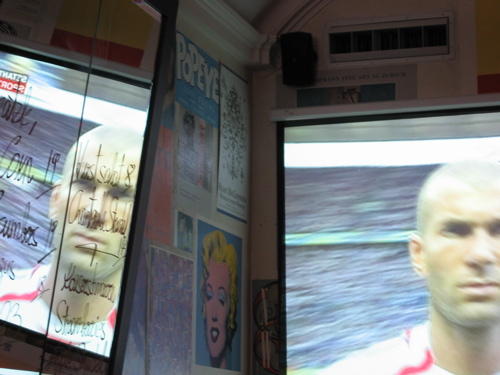
"Soccer—what a relief from baseball and all the steroid malarkey. No scandals, no national disgraces, no baffling instances of violence to explain to our kids—soccer's doing it big. Thanks, soccer! Just wait right here while we escort hockey from the building and line up your network deal."*
----
*Two puzzled emails in the space of ten minutes leads us to believe that our indirection meter is turned up too high, and/or our faith in the legibility of theatrical irony and connotative language is unwarranted. So: we don't think soccer is a unified body, or an actual person. Further, all professional sports are potentially violent, both in and of themselves and as catalysts for crowd behavior; all are prone to corruption; and all are colored by moral impurities. The rant above is meant to average out the general American prejudices against soccer and the specific feelings of one frustrated father who had to watch the final with two boys under the age of ten who were, and are, confused and hurt.
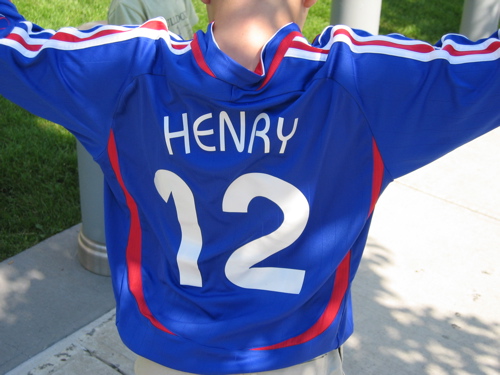
July 08, 2006
SUPER CLICK

There Eye go, there Eye go, there Eye go again. Here are some higher quality photos of the Boredoms' performance at Webster Hall on July 2.
PO PO

Received a very kind call from the poet Rodney Koeneke, and I see posted here a generous apology from Geoffrey Gatza of BlazeVOX. Case closed.
NO JACQUES IN MY BOX

Thank you to Douglas Wolk, Amar Kasap and Davin Kolderup for sending me copies of the first Scritti Peel Session. (Your underwhelming thank you gifts go out next week.) I, mistakenly, thought the "Derrida" 7-inch would be more common. Mais non!
July 07, 2006
GHOST IN THE MACHINE
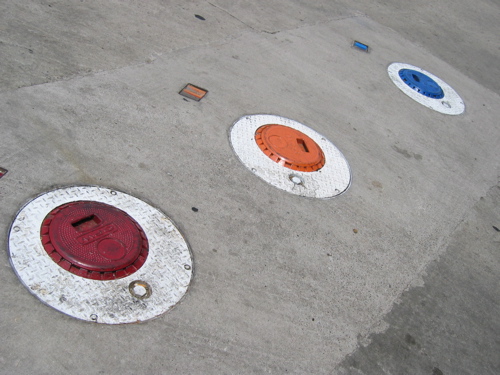
Were English soccer hooligans able to establish their fiefdoms of violence because the English police force has been clinging, for decades, to an idea of metropolitan civility that history hasn't even glanced at for sixty years? Are Americans—experts at individual acts of firearms testing on human subjects—less versed in crowd violence because their municipal police forces are modeled on the military, and not on fox hunting parties? Which presumptions to social order would you trade to avoid living with soccer hooligans? Would a paramilitary police force be just fine with you if you knew mob violence would pop up only every ten years or so? If you knew you wouldn't have to worry about mobs of twentysomethings swarming your subway on the way home from work? Give or take a riot?
THAT HOT SHIT

Have you spent any time thinking about "High School Musical"? You might want to, or you might not. The Nielsen SoundScan Mid-Year Music Industry Report for 2006 tells us this:
2006 Top Ten Selling Albums (01/02/2006-7/02/2006)
Title / Artist: Units Sold
1. High School Musical / Soundtrack: 2,620,801
2. Me and My Gang / Rascal Flatts: 1,997,356
3. Back to Bedlam / James Blunt: 1,659,040
4. The Breakthrough / Mary J. Blige: 1,503,584
5. Some Hearts / Carrie Underwood: 1,479,513
6. Now 21 / Various : 1,364,849
7. King / T.I.: 1,328,057
8. Taking the Long Way / Dixie Chicks: 1,268,706
9. Amore / Andrea Bocelli: 1,132,496
10. All the Right Reasons / Nickelback: 1,072,868
GREEN CAN'T COME TO THE PHONE RIGHT NOW
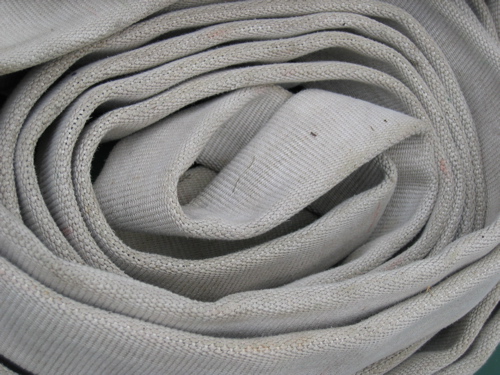
Retained counsel. Made plans. Listened to "The Word Girl" fifteen times.
July 06, 2006
JUST ASK
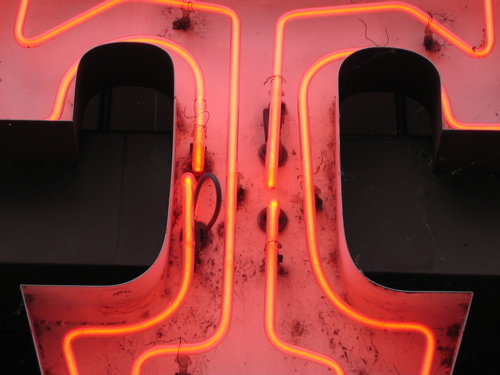
Rodney Koeneke, who I do not know from Adam, recently published a book of poetry called "Musee Mechanique." The cover of the book incorporates a photograph I took and posted on this site more than two years ago, here. Nobody obtained my permission to exploit this photo for commercial purposes.
Within the past year, a magazine and a rock band both contacted me to ask about reproducing photographs found on this site. They emailed me, asked my permission, and we worked out the (very simple) terms. I am pretty reasonable. But I don't accept someone jacking my photos. You want to reproduce a photo on your blog, for free, with a link? Go ahead. No need to even ask. But don't make me part of your commodity without asking me if I even want to be involved.
You'd think poets would have better manners than record companies.
